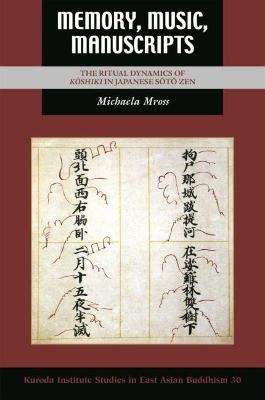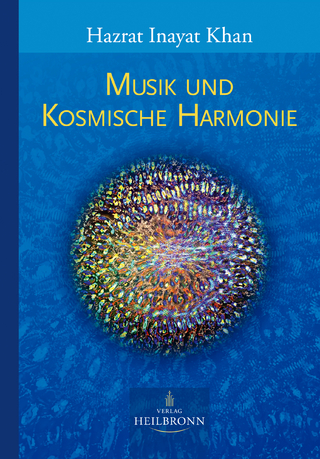
Memory, Music, Manuscripts
The Ritual Dynamics of Kōshiki in Japanese Sōtō Zen
Seiten
2022
University of Hawai'i Press (Verlag)
978-0-8248-9273-9 (ISBN)
University of Hawai'i Press (Verlag)
978-0-8248-9273-9 (ISBN)
Combines the study of premodern manuscripts and woodblock prints with ethnographic fieldwork to illuminate the historical development of the highly musical koshiki rituals performed by Soto Zen clerics.
Kōshiki (Buddhist ceremonials) belong to a shared ritual repertoire of Japanese Buddhism that began with Tendai Pure Land belief in the late tenth century and spread to all Buddhist schools, including Sōtō Zen in the thirteenth century. In Memory, Music, Manuscripts, Michaela Mross elegantly combines the study of premodern manuscripts and woodblock prints with ethnographic fieldwork to illuminate the historical development of the highly musical kōshiki rituals performed by Sōtō Zen clerics. She demonstrates how ritual change is often shaped by factors outside the ritual context per se--by, for example, institutional interests, evolving biographic images of eminent monks, or changes in the cultural memory of a particular lineage. Her close study of the fascinating world of kōshiki in Sōtō Zen sheds light on Buddhism as a lived religion and the interplay of ritual, doctrine, literature, collective memory, material culture, and music.
Mross highlights in particular the importance of the sonic dimension in rituals. Scholars of Buddhist and ritual studies have largely overlooked the soundscapes of rituals despite the importance of music for many ritual specialists and the close connection between the acquisition of ritual expertise and learning to vocalize sacred texts or play musical instruments. Indeed, Sōtō clerics strive to perfect their vocal skills and view kōshiki and the singing of liturgical texts as vital Zen practices and an expression of buddhahood--similar to seated meditation.
Innovative and groundbreaking, Memory, Music, Manuscripts is the first in-depth study of kōshiki in Zen Buddhism and the first monograph in English on this influential liturgical genre. A companion website featuring video recordings of selected kōshiki performances is available at https://searchworks.stanford.edu/view/dq109wp7548.
Kōshiki (Buddhist ceremonials) belong to a shared ritual repertoire of Japanese Buddhism that began with Tendai Pure Land belief in the late tenth century and spread to all Buddhist schools, including Sōtō Zen in the thirteenth century. In Memory, Music, Manuscripts, Michaela Mross elegantly combines the study of premodern manuscripts and woodblock prints with ethnographic fieldwork to illuminate the historical development of the highly musical kōshiki rituals performed by Sōtō Zen clerics. She demonstrates how ritual change is often shaped by factors outside the ritual context per se--by, for example, institutional interests, evolving biographic images of eminent monks, or changes in the cultural memory of a particular lineage. Her close study of the fascinating world of kōshiki in Sōtō Zen sheds light on Buddhism as a lived religion and the interplay of ritual, doctrine, literature, collective memory, material culture, and music.
Mross highlights in particular the importance of the sonic dimension in rituals. Scholars of Buddhist and ritual studies have largely overlooked the soundscapes of rituals despite the importance of music for many ritual specialists and the close connection between the acquisition of ritual expertise and learning to vocalize sacred texts or play musical instruments. Indeed, Sōtō clerics strive to perfect their vocal skills and view kōshiki and the singing of liturgical texts as vital Zen practices and an expression of buddhahood--similar to seated meditation.
Innovative and groundbreaking, Memory, Music, Manuscripts is the first in-depth study of kōshiki in Zen Buddhism and the first monograph in English on this influential liturgical genre. A companion website featuring video recordings of selected kōshiki performances is available at https://searchworks.stanford.edu/view/dq109wp7548.
Michaela Mross is assistant professor in the Department of Religious Studies at Stanford University. Robert E. Buswell, Jr. holds the Irving and Jean Stone Endowed Chair in Humanities at the University of California, Los Angeles (UCLA), where he is also Distinguished Professor of Buddhist Studies in the Department of Asian Languages and Cultures and founding director of the university's Center for Buddhist Studies and Center for Korean Studies.
| Erscheinungsdatum | 31.08.2022 |
|---|---|
| Reihe/Serie | Kuroda Studies in East Asian Buddhism |
| Zusatzinfo | 92 b&w illustrations |
| Verlagsort | Honolulu, HI |
| Sprache | englisch |
| Maße | 152 x 229 mm |
| Gewicht | 357 g |
| Themenwelt | Kunst / Musik / Theater ► Musik ► Musiktheorie / Musiklehre |
| Geisteswissenschaften ► Religion / Theologie ► Buddhismus | |
| ISBN-10 | 0-8248-9273-9 / 0824892739 |
| ISBN-13 | 978-0-8248-9273-9 / 9780824892739 |
| Zustand | Neuware |
| Informationen gemäß Produktsicherheitsverordnung (GPSR) | |
| Haben Sie eine Frage zum Produkt? |
Mehr entdecken
aus dem Bereich
aus dem Bereich
Grundbegriffe, Harmonik, Formen, Instrumente
Buch | Softcover (2021)
Philipp Reclam (Verlag)
7,80 €


